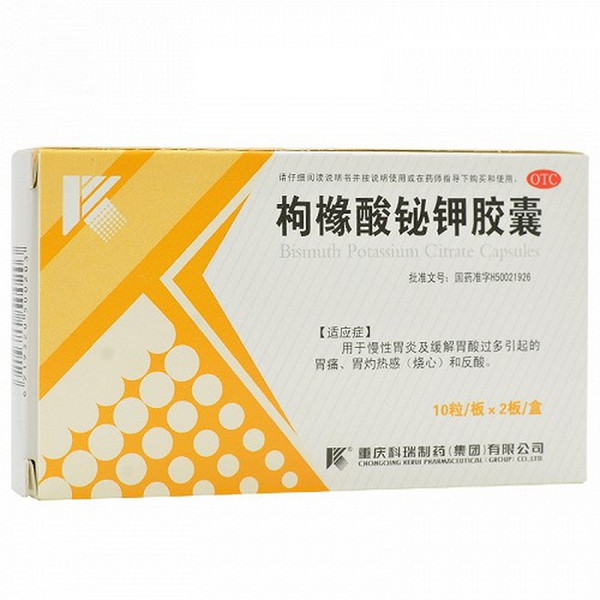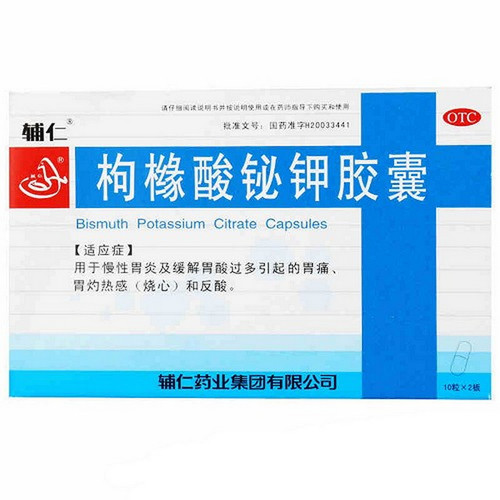Product Overview
[Drug Name]
Generic Name: Bismuth Potassium Citrate Capsules
Trade Name: KeRui Pharmaceutical Bismuth Potassium Citrate Capsules, 20 Capsules
Pinyin Code: KeRuiZhiYao ZuoZuoSuanZuoJiaJiaoNang 20Li
[Main Ingredients]
Each capsule contains 0.3g of bismuth potassium citrate (equivalent to 0.11g of bismuth). Excipients include starch, mannitol, sodium carboxymethylcellulose, and magnesium stearate.
[Properties]
This product consists of white granules or powder.
[Indications/Main Functions]
For chronic gastritis and relief of stomach pain, heartburn, and acid reflux caused by excessive gastric acid.
[Specifications]
20 capsules
[Dosage and Administration]
Oral administration: 0.3g four times daily. The first three doses should be taken half an hour before meals, and the fourth dose should be taken at bedtime with warm water. Avoid carbonated beverages (such as beer). Do not drink milk or take antacids or other alkaline drugs half an hour before or after taking the medicine. The course of treatment is 4-8 weeks, and then stop taking bismuth-containing drugs for 4-8 weeks. If necessary, continue taking it for another 4-8 weeks.
[Adverse Reactions]
1. This drug is relatively safe at regular doses and within the prescribed period, but general adverse reactions may also occur: (1) Digestive system: During the use of this drug, there may be an ammonia smell in the mouth, and the tongue coating and stool may turn gray-black, which is easily confused with black stool symptoms; some patients may experience nausea, vomiting, loss of appetite, diarrhea, constipation and other symptoms when taking it. The above symptoms will disappear on their own after stopping the drug. (2) Nervous system: A few patients may experience mild headaches, dizziness, insomnia, etc., but they can be tolerated. (3) Others: Some patients may develop a rash. 2. Long-term high-dose use may cause the following adverse reactions: (1) When the blood concentration is greater than 100ng/ml, it may cause bismuth encephalopathy; (2) Urinary system: Long-term use of this drug may cause renal toxicity; (3) Bones and muscles: Adverse reactions to bones often occur in different parts of the body and are related to excessive bismuth concentration in the bones. The most common is osteoarthritis related to bismuth encephalopathy, often with unilateral or bilateral shoulder pain as a precursor symptom.
[Contraindications]
1. Patients who are allergic to this drug are prohibited. 2. Pregnant and lactating women are prohibited. 3. Patients with severe renal insufficiency are prohibited.
[Precautions]
1. Use with caution in the following situations: ① Patients with liver dysfunction. ② Children. ③ Acute gastric mucosal lesions. 2. If overdose or serious adverse reactions occur, seek medical attention immediately. 3. Do not take other bismuth preparations while taking this product, and do not take large doses for a long time. Patients who use this drug for a long time should pay attention to the accumulation of bismuth in the body. 4. When used to kill Helicobacter pylori, it must be used in combination with two antibiotics. The specific regimen should be followed according to your doctor's instructions. 5. Avoid alcoholic or carbonated beverages during treatment, and limit coffee, tea, and other beverages. 6. High doses of this drug can cause reversible nephropathy, which can develop within 10 days. 7. Overdose treatment: Emergency treatment, gastric lavage, repeated administration of activated charcoal suspension and laxatives, monitoring of blood and urine bismuth levels and renal function, and symptomatic treatment. When blood bismuth levels are elevated and accompanied by renal dysfunction, complexation therapy with succimer or dithiothreitol may be used. Severe renal failure may require hemodialysis. 8. Keep this drug out of the reach of children. 9. Used drug packaging should not be discarded.
[Drug Interactions]
Do not take with antacids.
[Pediatric Use]
Unclear.
[Elderly Use]
Unclear.
[Pregnant and Breastfeeding Women]
This drug is contraindicated in pregnant and breastfeeding women.
[Overdose]
Unknown.
[Pharmacology and Toxicology]
This product is a gastric mucosal protective agent. In the presence of gastric acid, it forms a diffuse protective layer covering the ulcer surface, preventing the invasion of gastric acid, enzymes, and food, thereby promoting mucosal regeneration and healing. This product also protects the gastric mucosa by reducing pepsin activity, increasing mucin secretion, and promoting the release of progesterone (PGE2) from the mucosa. Furthermore, it has a killing effect on Helicobacter pylori (Hp), thereby promoting the healing of gastritis.
[Pharmacokinetics]
It forms an insoluble precipitate in the stomach, with only a small amount of bismuth being absorbed. Bismuth is transported by binding to proteins with a molecular weight of 50,000 or more. Bismuth is primarily distributed in the liver and kidneys and excreted in the urine through the kidneys.
[Storage]
Room temperature. Validity Period: 24 months
[Approval Number]
National Medical Products Administration H50021926
[Manufacturer]
Chongqing Kerui Pharmaceutical (Group) Co., Ltd.








